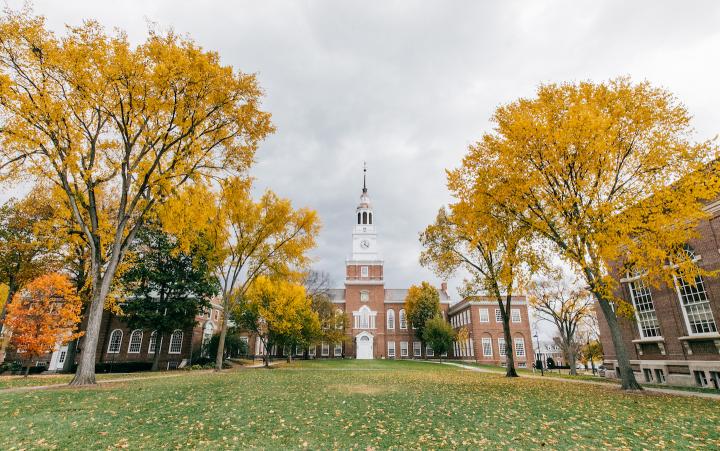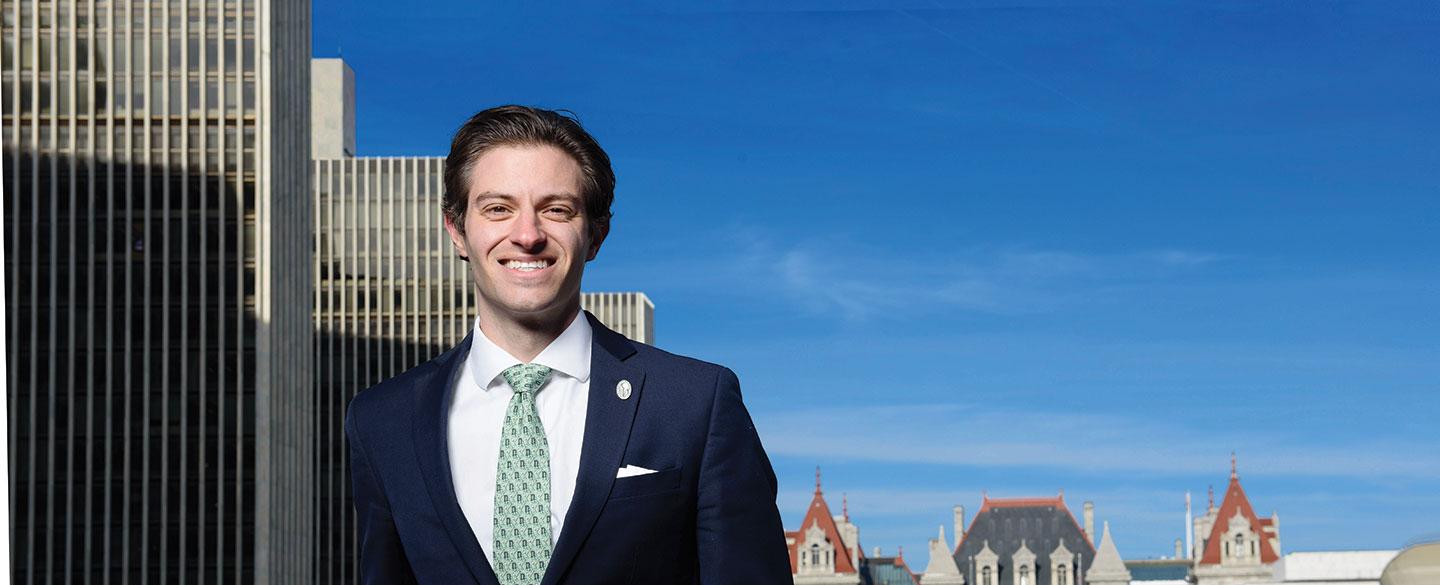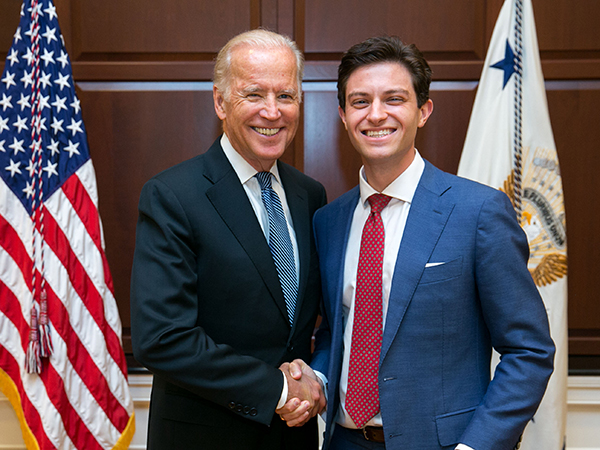Three Generations of Manegolds Direct $10 Million Bequest for Arts and Sciences

A U.S. Navy veteran, Nathan Bruschi made a bequest that will support both the Dartmouth Uniformed Service Alumni and the College

For Nathan Bruschi ’10, serving others is in his genes. As a high school student at The Albany Academy, he created and instituted a school-wide leadership program centered around community service that is still in use today. Now he’s chief financial officer at GENESYS Consulting, which helps residents in the Albany area secure local jobs in information technology.
Immediately after Dartmouth, he served as an intelligence officer in the U.S. Navy, directing analysis teams in Japan and humanitarian missions in Central America. “I would say my commitment to service goes back to my childhood and the Boy Scouts, where volunteer work was the center of our social lives,” says Nathan. “Coming to Dartmouth really broadened my worldview, and gave me an even stronger sense of what service could be.”

Eager to help his fellow students engage with one another, Nathan became interested in student government and was elected secretary and treasurer of the Dartmouth Student Assembly. Members at that time immersed themselves in several major discussions at the College, including need-blind admissions for international students and increasing student services, such as bus service to New York City and Boston.
“Dartmouth taught me so much,” says Nathan. “Having a more liberal education and strong connection to faculty exposed me to many different ways of thinking and challenged me to try new things."
I always felt I had to do something substantial to help other students benefit the way I did.
“I was skimming an article in the Dartmouth Alumni Magazine about planned giving when I realized that adding Dartmouth to my will made perfect sense. Dartmouth will surely outlive me and when it does, I want my impact to live on through all the ways my bequest touches future students.”
Taking courses at Dartmouth in everything from art history to economics and studying abroad in the UK and Spain encouraged Nathan to see his point of view was just one among many. “I learned that a lot of leadership,” he says, “is in framing debates and listening to others’ perspectives, with the goal of convincing others—that kind of intellectual leadership is just as important as any kind of personal charisma someone can have.”
While at Dartmouth, Nathan felt that there was too much tension around the idea of free speech in academia.
“Important topics that happened to be controversial were often avoided,” he says, “for the sake of making students feel comfortable and welcomed.” He thought there must be a good way to model the benefits of free speech, in an organized fashion. So, he formed the Dartmouth Political Union with a clear premise: to bring students together from many different political parties, debate issues on their merits, and work toward mutual understanding.
The concept took off. Liberals, conservatives, libertarians, centrists, and socialists all came together and debated a topic each week, such as whether the Bush tax cuts should be made permanent or whether health care is a human right.
“You really got to see the strange bedfellows and coalitions that would build up between groups with different values,” Nathan says. “Just to debate in these scenarios, you had to understand, ‘How would a socialist view this problem and how can I speak to that?’ It encouraged more healthy, non-binary politics.
“We recruited Gene Robinson, the first openly gay bishop in New Hampshire, to come and speak and join a debate on whether the U.S. should legalize same-sex marriage. We had a packed house and people came away with deeper understanding.”
 Nathan has continued taking on leadership roles after Dartmouth, working in national security affairs in the White House, under Vice President Joe Biden, and serving his local community in Albany. As an intelligence officer in the U.S. Navy, he directed a humanitarian mission to Belize, Guatemala, and Honduras. His job was to lead doctors, nurses, and construction crews to rebuild infrastructure and bring health care services to remote villages.
Nathan has continued taking on leadership roles after Dartmouth, working in national security affairs in the White House, under Vice President Joe Biden, and serving his local community in Albany. As an intelligence officer in the U.S. Navy, he directed a humanitarian mission to Belize, Guatemala, and Honduras. His job was to lead doctors, nurses, and construction crews to rebuild infrastructure and bring health care services to remote villages.
“My work covered everything from taking out bat infestations in shuttered schoolhouses to going into remote villages and helping expectant mothers deliver healthy children, and training local police to defend themselves against the drug cartels,” he says. “Since I was one of the lowest-ranking officers in the mission, it was a challenge to manage people who outranked me. I had to rely on my negotiation skills to get my superiors to see the bigger picture of our mission, that there was a lot more good work we could do by working together. We ended up helping a lot of people.”
In 2013, Nathan founded Dartmouth Uniformed Service Alumni, with the initial goal of finding mentors for his military career. The organization has since expanded its mission and grown to nearly 600 members with activities and events year-round and a strong mentorship program. Alumni service members are paired with other alumni in the same branch to gain perspective and share experiences. The organization reaches out to transitioning service members, too, encouraging them to apply to Dartmouth.
“A big piece of this,” says Nathan, “is to help reconnect some of our older alumni veterans to Dartmouth, to show them Dartmouth truly values what they have done. Each year, we present one fellow veteran with the James Wright Award for Distinguished Service, which celebrates the veteran’s lifetime accomplishments as an example to others.
“All the work I do for Dartmouth, whether it is helping veterans, raising money for the Dartmouth College Fund, or setting up a bequest, is about paying it forward. Reaching out in that way is so important.”
Dartmouth will surely outlive me and when it does, I want my impact to live on through all the ways my bequest touches future students.”